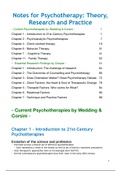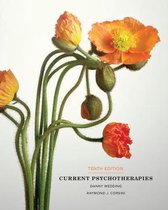Notes for Psychotherapy: Theory,
Research and Practice
- Current Psychotherapies by Wedding & Corsini - 1
Chapter 1 - Introduction to 21st-Century Psychotherapies 1
Chapter 2 - Psychoanalytic Psychotherapies 7
Chapter 4 - Client-centred therapy 19
Chapter 6 - Behavior Therapy 31
Chapter 7 - Cognitive Therapy 41
Chapter 11 - Family Therapy 52
- Essential Research Findings by Cooper - 64
Chapter 1 - Introduction: The challenge of research 64
Chapter 2 - The Outcomes of Counselling and Psychotherapy 66
Chapter 3 - Does Orientation Matter? Great Psychotherapy Debate 72
Chapter 4 - Client Factors: the Heart & Soul of Therapeutic Change 78
Chapter 5 - Therapist Factors: Who works for What? 84
Chapter 6 - Relational Factors 90
Chapter 7 - Technique and Practice Factors 99
- Current Psychotherapies by Wedding &
Corsini -
Chapter 1 - Introduction to 21st-Century
Psychotherapies
Evolution of the science and profession
- this book surveys a diverse set of effective psychotherapies
- Each represents a vision of the human as well as set of distinct treatment procedures
- most therapeutic approaches have an increasingly short half life
- Several contemporary psychotherapies have their roots in the early 20th century
1
,Historical Foundations of Psychotherapy
- humans have always sought means to remedy the mental disorders that have afflicted them
- Some of them (eg. Healing rituals) were unscientific, though not necessarily ineffective
- Pre-christian templelike asklepeia
- Meditation, religious lectures etc.
- Secularistic Stream of psychophysiological treatment
- Hippocrates
- Surprisingly scientific
- Hellenist physicians
- Brain as seat of knowledge and learning and also source of depression, delirium and
madness
- Hippocrates
- Address illness by natural means
- psychotherapy as a domain of science did not exegete until the 18th century
The Unconscious
A Primordial Construct
- the unconscious plays a central role in many theories
- Unconscious was a key construct in the psychotherapies that emerged in the West in 19th
century
- Scientific study of the unconscious is believed to have started with renowned polymath
Wilhelm Leibniz
- Studied the role of subliminal perceptions in our daily life
- Coined the term ‘dynamic’ to describe the forces operative in unconscious mentation
- Johann Friedrich Herbart
- Attempted to mathematicize the dynamics describing the passage of memories to and from
the conscious and the unconscious
- Tactic ideas struggle with one another for access to consciousness as dissonant ideas repel
and depress one another
- Associated ideas help draw each other into consciousness
- Example of famous scientists who attributed meaning to the unconscious
Mesmer and Schopenhauer
- two of the most influential and creative thinkers in the early 19th century were Franz Anton
Mesmer and Arthur Schopenhauer
- Mesmer:
- Pioneer of hypnotherapy
- Effectively discredited the exorcist tradition that had dominated the pre-enlightenment
Europe
- But many quaint and unsubstantiated hypotheses
- Importance of rapport between therapist and patient
- Stressed the influence of the unconscious in shaping behavior
- Demonstrated influence of personal qualities of the therapist and selective function of
memories
- Importance of patient’s confidence in treatment procedures
- 3 distinct streams of investigation:
1) systematic, lab-bench empirical work
2) Philosophers of nature
2
,3) Clinical researchers
Psychotherapy-related science in the 19th century
The Natural Science Empiricists
- some of the greatest scientists of the 19th century (Fechner, Helmholtz) conducted seminal
research in the area of cognitive science
- Fechner’s work:
- Distinction between theatres of the waking and sleeping states, especially the dream state
- Unconscious exists
- Attempted to measure the intensity of psychic stimulation needed for ideas to cross the
threshold form the unconscious to full awareness (now: working memory)
- As well as the intensity of the resultant perception
- Freud, Gestalt, Ericksonism
- Helmholtz:
- Discovered the phenomenon of ‘unconscious inference’ -> ‘a kind of instantaneous and
unconscious reconstruction of what our past taught us about the object’
- Experimentalist
- Referred to in Kahnemanns ‘slow and fast thinking’
- can be seen as organicist tradition
- Emil Kraeplin
- Saw no use in investigating medication
- Classified diseases, described them and schematised their courses
- Established benchmarks for ongoing prognoses
- Basis for DSM
- Only psychological approach to mental illness as effect
The Psychologist - Philosopher
- philosophers of nature had a much greater long-term influence on the development of the
psychotherapies described in the following chapters of the book than did the laboratory-based
scientists
- Philosophers were romantics -> rooted in nature, beauty, homeland etc,
- Schopenhauer:
- ‘The world as Will and Idea’
- Provided ideational first for generations of psychological researchers
- Treatise on sexuality and realm of unconscious
- We know things that were are unaware that we know and we are largely driven by blind,
irrational forces
- Irrationalist and pansexual view of human behavior
- was deterministic and also pessimistic
- Carus: developed an early and sophisticated schema of the unconscious
- Several levels to the unconscious
- Humans interacting do so simultaneously at various levels of their consciousness and
unconsciousness
- Both the therapist and client engage in transference and countertransference
- Non-linear messages systematically and simultaneously radiate in all directions
- Nietzsche:
- Conscious thinking is a more or less fantastic commentary on an unconscious, perhaps
unknowable but felt text
3
, - Developed notions of self-deception, sublimination, repression, etc.
- Used to conceals more serious personal failures -> defence mechanisms
The Clinician-Researchers
- Benedikt:
- Developed concept of seeking out and clinically purging pathogenic secrets (later an
essential part of analytic psychotherapy)
- psychotherapies are in constant evolution
- But clinicians often continue to use the strategies, techniques, and guiding principles they
learned in their graduate professional programs, even though they may have become
outdated
- Remaining at a fixed stage of one’s continually evolving profession is not a desirable
outcome
The impact of the biological sciences on psychotherapy
- when patients learn new ideas, concomitant alterations of the brain occur
- Every encounter with our environment causes changes within us and especially in our neural
functioning
- Once skills are truly learned and lodged permanently in storage, it is difficult to unlearn them
- Education implies permanence
- Task of the therapist in most cases is to help the patient fashion alternative and ‘future’
memories supported by newly adopted motivational schemas
- Grawe:
- Psychotherapy appears to achieve its effects through changes in gene expression at the
neuronal level
- Further neuronal embedding of patients in their dysfunctional past by prodding them to
ruminate about that past does not erase their painful memories nor their dwelling on these
memories
- Effective therapists teach parents how to avoid dysfunctional ruminations, harmful
behavioural routines, and maladaptive habits that will advance their well being and that of
others with whom they interact
- Help clients develop social, interpersonal, self-disciplinary habits
- neuronal restructuring -> through learning processes -> enables changes in behavior, affect
and mentation
- Plasticity provides us the affordances of redemption and improved well being
- Much of this is achieved through epigenetic change:
- External events can turn genes off or on by enabling the synthesis of proteins that act on
the genome in the cell nuclei
- Introducing minor novelties into the clients life can have enormous impacts on the way they
perceive and experience themselves
- Neurological perspective on psychotherapy allows the creative exploration of the cognitive
and emotional variables
- Culture functions as genetic enablers
- Culture is sedimented in the body and pervades our central nervous system
- Epigenetic effect can operate for better or for worse, depending on the richness and
benignancy of one’s culture
- Copley biocultural matrix of the organic and the environmental
4






